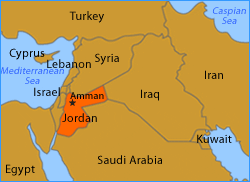Women in Jordan live in a mostly traditional Arab culture and are governed by a version of Sharia law. Their ruler, King Abdullah II, was educated in the United States, and his wife, Queen Rania, who had a highly successful business career before becoming queen, is a strong advocate for women’s rights. Whether or not Abdullah is inclined to revamp Jordanian laws and practices, drastic changes would likely be impracticable; the king knows that any measures perceived to be anti-Islamic could lead to violence or even revolution. (More than half of Jordan’s residents are stateless Palestinians, many of them young, unemployed, disaffected, and Islamist.)
Yet the country appears to be implementing some changes, however gradually. The U.S. State Department’s 2004 report on human rights in Jordan noted that, unlike in 2003, no cases of female genital mutilation were reported. Sexual harassment is strictly forbidden, and is not thought to be a widespread problem. In theory, Jordan permits women educational and employment opportunities in medicine, law, engineering, and other professions — and civil law guarantees equal pay for equal work. Yet in practice, many Jordanian women feel societal pressures discouraging them from such professions. Sharia law in Jordan mandates that male heirs receive twice the money that females inherit; women may not pass citizenship on to their children.
In late 2002, Queen Rania caused a stir when she issued a decree granting Jordanian women the same rights as men in passing citizenship to their children. Rania is Palestinian, and many Jordanians insisted that her decree was designed to create a Palestinian majority among Jordanian citizens. Opponents argued that she would bestow Jordanian citizenship upon hundreds of thousands of children born to Palestinian fathers and Jordanian mothers. (Certainly, some objected to the decree simply because it increased rights for women.) As a result of the controversy, Jordan’s cabinet quietly weakened Rania’s decree to the point of obsolescence. In the fragile world of Jordanian politics, even a simple gesture toward gender equality can have unforeseen ramifications.



